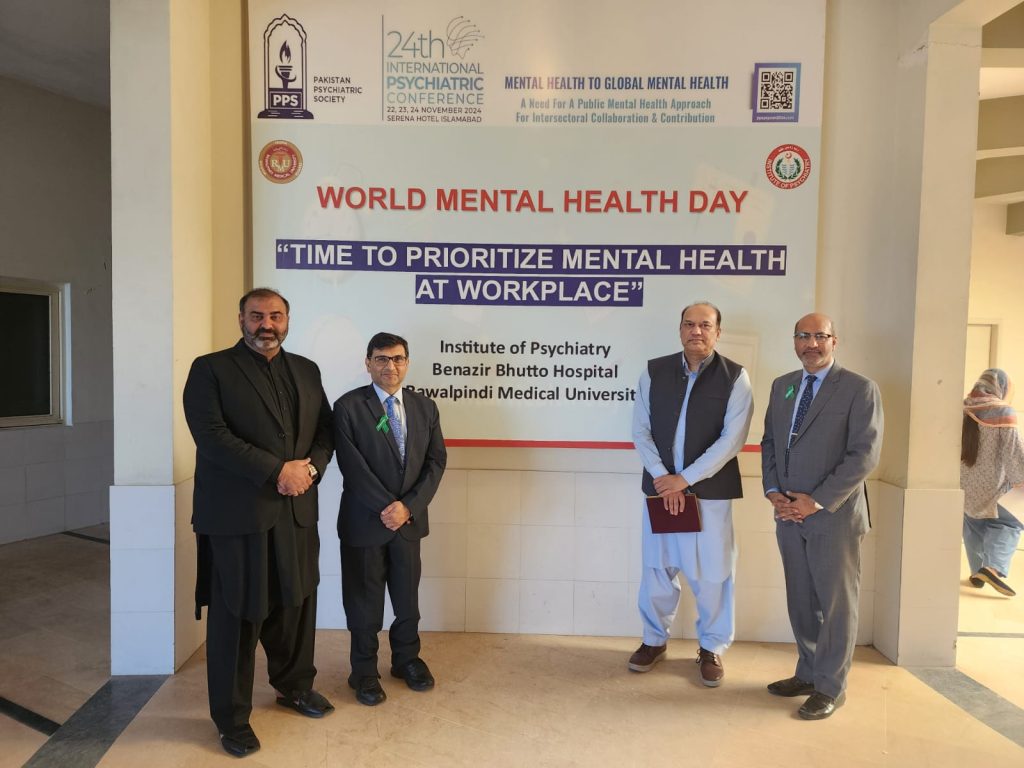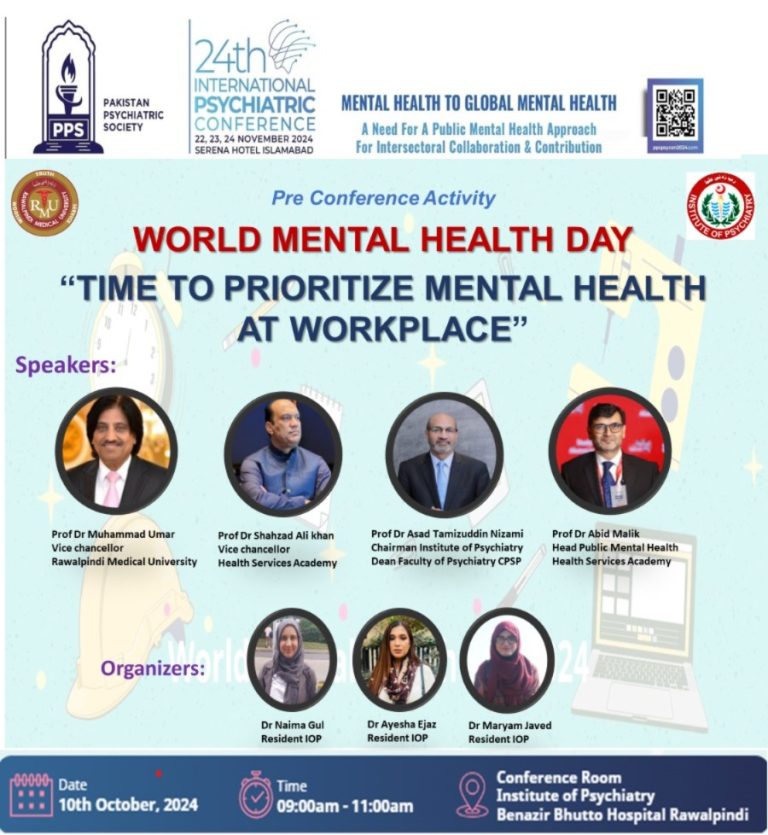World Mental Health Day 2024

World Mental Health Day Observance
The session commenced at Institute of Psychiatry, BBH, Rawalpindi on 10 October 2024, marking the observance of World Mental Health Day.
Prof. Asad Tamizuddin Nizami formally opened the event, welcoming the distinguished guests, Prof. Shahzad and Prof. Abid Malik, and introducing them to the audience.

Distinguished Speakers
Prof. Asad Nizami :
In his opening remarks, Prof. Asad Nizami emphasized that this day was not merely a celebration but a crucial reminder to address the ongoing challenges surrounding mental health. He underscored the significance of mental well-being, outlining how the terminology for mental illness has evolved over time—from “insanity” to “psychiatric illness,” then “mental well-being,” and now simply “well-being.” He pointed out the importance of recognizing this shift, particularly in the post-COVID era, where reduced socialization has contributed to a rise in mental health challenges. Prof. Nizami also presented strategies for improving mental health in the workplaceProf. Abid Malik (Head of Department of Public Mental Health at the HSU):
Following this, Prof. Abid Malik discussed the connection between immunity and mental health. He highlighted the crucial role a healthy immune system plays in maintaining mental well-being, reinforcing the message that “What is good for the heart is good for the mind.” He emphasized the importance of healthy immune system for mental wellbeing.Prof. Shahzad Ali Khan (Vice Chancellor, Federal Health Services University):
Prof. Shahzad, addressed the profound emotional toll faced by doctors who are frequently exposed to suffering. He spoke about the societal pressures placed on high-achieving students and the stress that healthcare professionals endure. This constant pressure often results in two groups: one that becomes apathetic and the other, empathetic. Both groups, he noted, suffer in different ways. Prof. Shahzad proposed the practice of “detached empathy” as a solution, which involves maintaining emotional balance while caring for others, is essential for healthcare workers.Seminar Highlights
A lively discussion followed, centered around the idea that only when we are well ourselves, we can effectively help others.
To mark the occasion, the guests were presented with souvenirs, and the event concluded with a walk, symbolizing the collective commitment to mental well-being
- World Mental Heath Day organized at the Institute of Psychiatry, Rawalpindi Medical University – 10th October 2024
“Time to Prioritize Mental Health at the Workplace”
- Prof. Dr Asad Nizami introduced the esteemed speakers – Prof Dr Shahzad Ali Khan, Vice Chancellor, Federal Health Services University and Prof Dr Abid Malik, Head of Department of Public Mental Health at the HSU
- A discussion followed, centered around the idea that when we are ourselves well – only then, we can effectively help others.
- The event concluded with a walk – health professionals and the patients symbolizing the collective commitment to mental well-being.
Pre-Conference Activities
Inaguration of PPS SECRETARIAT : 7th September 2024
On 7th September 2024, the land procured for PPS Secretariat in Islamabad was handed over to the PPS Cabinet. Professor Muhammad Muitaba, Secretary General PPS paid thanks to Prof Asad Nizami and Prof Asif Kamal for their efforts over the last one year to complete this task, which was assigned to them by the PPS cabinet. Prof Ghulam Rasool and Prof Mukhtar Ul Haq played a vital role in supporting the smooth process and completion. All the colleagues from the PPS Cabinet attended the handing over and taking over ceremony
Workshop on Problem Management Plus (National Training of the Trainers) : 29 - 31st August 2024
During Workshop on Problem Management Plus (National Training of the Trainers) three Days rigorous training was done from 9am to 5 pm for the Master Trainers – trained in person and facilitated by Trainer from UK online
Inception meeting for Workshop on Problem Management Plus : 29th August 2024
The inception meeting was held in collaboration with the WHO Office and the Federal Ministry of Health. Prof Rizwaan Taj and Prof Wahab Yousafzai participated from Federal Capital. Prof Wajid Ali, Prof Mukhtar ul Haq, Dr Firaz, and Dr Imran from KPK, Prof Ali Madeeh and Dr Noman from Punjab, Dr Jawed Dars and Dr Washdev Sindh, Prof Ghulam Rasool and Dr Hazrat Ali participated from Balochistan. Prof Atif Rahman, Prof of Psychiatry at the University of Liverpool, who is the master trainer for PM Plus, participated in person
Interactive session on “How to write a Scientific Paper” : 13th August 2024
A one day interactive session was held in Institute of Psychiatry on 13th August 2024 on “ How to write a Scientific Paper”. Professor Dr Moazzam Ali discussed parts of writing a research paper. A Question Answer session was held at the end of workshop
One day worksop for the wellbeing of the Judges at the Federal Judicial Academy at Islamabad : 2nd July 2024
- The Institute of Psychiatry, Rawalpindi Medical University conducted a one day worksop for the wellbeing of the Judges on 2nd July 2024 at the Federal Judicial Academy at Islamabad 60 Session Judges (both male & female) were selected for the worksop who scored the highest in an assessment examination conducted by the Supreme Court of Pakistan.
- Workshop was facilitated by Prof Asad Nizami & his team at the Department of Forensic Mental Health at IOP along with Dr Zahoor Ahmed, Ambassador of Pakistan in Spain, who has a PhD in Mental Health from the University of Liverpool, UK and is a master trainer for WHO Problem Management Plus. Dr Zahoor Ahmed, Ambassador of Pakistan in Spain, Rawalian from Batch 13, facilitated the workshop online from Madrid, Spain.
- The workshop brought forth issues with pertinent importance for both the Judiciary and the Health Professionals and on the request.of the Federal Judicial Academy – another larger workshop will be organized at the 24th International Psychiatric Conference of Pakistan Psychiatric Society in November in Islamabad.
Art Competition : July 2024
Art competition organized in collaboration with Child & Family Psychiatry Department King Edward Medical University, Institute of Psychiatry, Rawalpindi Medical University, Connections Comprehensive Psychiatric Services, SAARC Psychiatric Federation (SPF), Asian Federation of Psychiatric Associations (AFPA) and the WPA 2020-23 Task Force
Interactive Session on Teaching Behavioral Sciences and Psychiatry : June 8, 2024
Prof Mowaddat Rana for facilitated an interactive session with the medical students at IOP to get feedback and formulate a strategy for teaching Behaviour Sciences & Psychiatry in a cohesive structure leading to a separate summative assessment in the Fourth Professional Examination
Two Day meeting for Adolescent Mental Health by the Ministry of National Health Services, Regulation & Coordination Islamabad : 6th - 7th June 2024
Institute of Psychiatry is a Member of the Sub Commitee on Adolescent Mental Health. Professor Dr Asad Tamizuddin presented on the Policy for Adolescent Mental Health in Pakistan at the Ministry of Health Services Regulation & Coordination Islamabad
Workshop on Stress Management for Caregivers of Children with Problems of Brain Development : 18th May 2024
A workshop was conducted on Stress Management for Caregivers of Children with Problems of Brain Development by Child and Adolescent Mental Health Service – Institute of Psychiatry. Parents and School teachers participated in the workshop
Interactive session to sensitize for the PM Plus National Master Trainers Training and Training of SCID for Psychosis screening : 30th March 2024
Dr Siham Sikander lead an Interactive in Institute of psychiatry to sensitize faculty & residents for the PM Plus National Master Trainers Training and training of SCID for Psychosis
Interactive Session on - Interface of Liaison Psychiatry with Public Mental Health : 5th March 2024
Interactive Session was facilitated by Prof Tayyab Tahir highlighting the roadmap to establish & sustain liaison psychiatric services in Pakistan. Interactive session included discussion for the residents & consultants for working with the mental health services in the UK
Focus Group Discussion on"eHealth Supported Interventions for Substance Use Disorders : 2nd March 2024
- PILL Pakistan Institute of Living and Learning conducted a Focus group discussion with mid career psychiatrists in Institute of Psychiatry to share awareness based content on substance use disorder and it’s coping strategies under NRPU Project titled “eHealth Supported Interventions for Improving Care for Young People with Substance Use Disorders”.
Inaguration of GRID - Centre for Global Health Research Implementation & Development - 3rd February 2024
The story of the Centre for Global Health Research Implementation & Development – IOP GRID – created & almost completed in only one week ! All the faculty members, psychologists, residents, house officers were present at the launch of the Centre for Global Health Research Implementation & Development – IOP GRID

